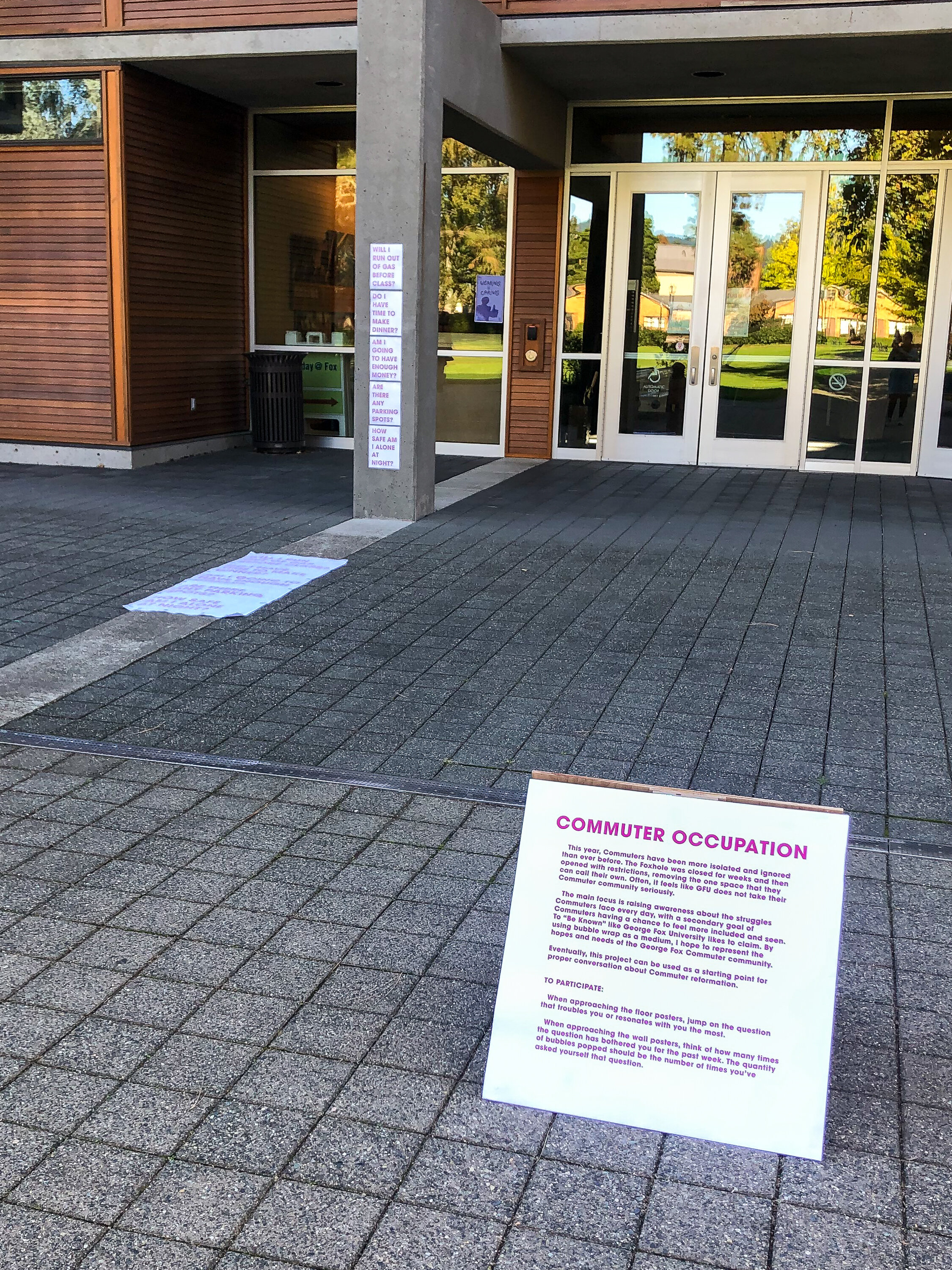‘Commuter Occupation’ Signs Outside Stevens Spark Controversy
Reported by: Aurora Biggers
NEWBERG, Ore. – On Oct. 27, David Johnstone, the associate dean of students and director of Commuter Life at George Fox University (GFU), sent an email to commuters expressing concern over a sign installation outside Stevens, which voiced discontent with Commuter Life’s treatment of commuters in 2020. Johnstone asked for the signmakers to reveal themselves, stating he would “love to visit with the signmakers.”
Dianne Martin, a senior graphic design major at GFU, told The Crescent she made the signs.
“It was a project from my Creative Action Studio class, run by Brandon Waybright, that was supposed to start a conversation or discussion on a problem within my specific community,” Martin said, “I have been a George Fox University commuter for roughly 4 and a half years, so I created a project that focused on what commuters struggle with or have to worry about behind the scenes.”
The main sign, labeled “Commuter Occupation,” stated, “This year, commuters have been more isolated and ignored than ever before,” and cited the Foxhole being closed as a grievance. The sign went on to say, “The main focus is raising awareness about struggles commuters face everyday, with a secondary goal of commuters having a chance to feel more included and seen. To ‘Be Known’ like George Fox University likes to claim.”
A second sign listed questions, which presented problems commuters may face and invited commuters to interact with the installation by jumping on a third sign made of bubble wrap. By jumping on the bubble wrap, commuters were signifying which problem or question that “most troubles” them or “resonates.”
The sign posed the questions:
Will I have enough gas before class?
Am I going to have enough money?
Do I have enough time to make dinner?
How safe am I alone at night?
Are there enough parking spots?
The signs were not up for long though; Stevens faculty removed them.
“The signs were taken down, but not out of malice or intent to silence a protesting voice,” Martin said, “I did not exactly ask permission to put it up or leave it there overnight.” Martin was able to retrieve her signs from Stevens faculty.
On Nov. 8, students may have noticed an announcement in the Daily Bruin reminding students to “please note that any poster, sign, or display must be approved by ASC or the administration before it is posted on the Newberg campus.”
While Johnstone did not confirm that the message was sent out in response to Martin’s signs, he did state, “The university has a policy that requires that signs be approved.”
Martin did meet Johnstone for breakfast to discuss the signs, and she was not penalized for the installation. “I did not receive a penalty for it, but it actually gained a lot more attention and traction than I was prepared for,” Martin said. “I will say though that I did not do this project to gain individual fame, but to bring attention to what commuter students go through.”
According to Johnstone, the signs “reflected the sadness of the season.” 12-15% of commuters have experienced isolation or/and quarantine, he noted. “Unfortunately COVID-19 has rippled through the entire community.” This, Johnstone seems to suggest, is why commuters like Martin may be feeling less connected than prior years.
“My interpretation of the signs were that they were more of a lament than a protest,” Johnstone said, “The sign maker had some intriguing ideas that I need to consider as well.”
The signs did drum up some controversy. “Through past experiences, I have encountered resident-based students who never realized what it means to be a commuter until we talked about it,” Martin said. But not all commuters agreed with her grievances.
In our search for the sign maker, a number of commuters sent The Crescent emails relating their opposing view to Martin’s installation. One commuter, Alex Ray, who is also a senior but a first-year commuter wrote, “I am frustrated that the sign-maker feels compelled to speak on behalf of all commuters. I have talked to some other commuters and we do not agree with the sentiment of the signs in front of Stevens.” Ray said he does not feel “isolated or ignored,” as Martin’s signs stated.
Ray also disagreed with some of Martin’s issues with Commuter Life, “I do not feel a sense of ownership over the FoxHole and am not burdened by my lack of access to it (to whatever extent that may be). I do not think that George Fox University owes me a space that ‘I can call my own,’ Ray said, “I also fail to see how George Fox is responsible for things like my gas money, open parking spots, or creating time for me to make dinner. It is not the onus of the school to hold my hand as I navigate normal everyday responsibilities.”
In a follow-up interview, Ray stated he felt sympathetic towards Martin, “I feel super sympathetic; I just think their frustration might be misguided. I don't think the university is at fault. They’ve done a lot for us during these times.”
Martin was pleased with the student and faculty response to her signs, “A lot of conversations have been started since then and while not everyone felt the same exact way I did, my installation helped them to open up about their own struggles or suggestions on how the Commuter Life community,” Martin said, “and George Fox University can work to improve what it means to be a commuter.

